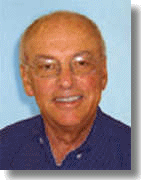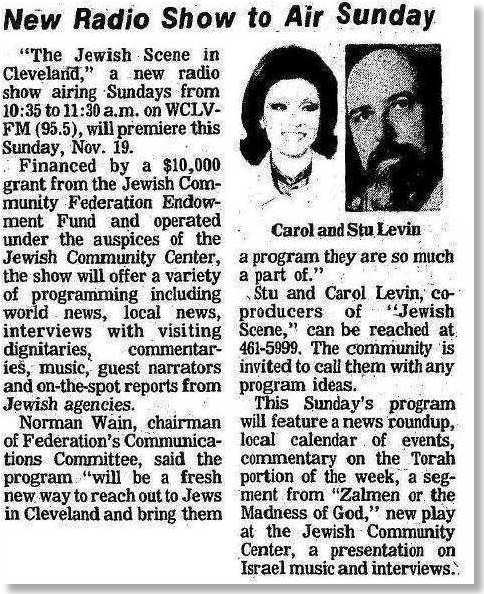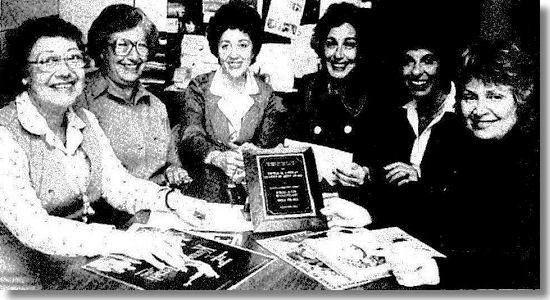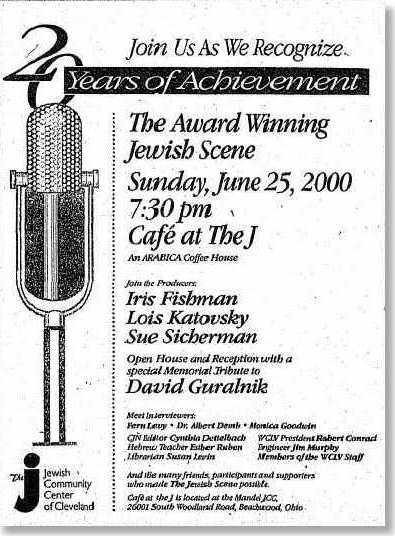|
The beginning
Advertising executive Sam Abrams had heard
Jewish community radio programs in
other cities and thought Cleveland
should do the same. In 1978, as the
chair of Federation's subcommittee on radio,
he proposed the idea to Norman Wain,
then the chair of Federation's
Communications Committee. Norman
Wain moved the concept to reality.
He formed an advisory committee
which included Sam Abrams, Jerry
Barach (editor of the Cleveland
Jewish News), Norm Friedman, David
Guralnik, Belle Likover (of the
JCC), Nina Liston, Neil Newman and
Peggy Wasserstrom. Then he created a
pilot tape and with it was able to
secure a grant of $10,000 for the first
year from the Federation Endowment
Fund. The JCC
would administer the programs and
the CJN would be a
partner in the enterprise.
 |
|
In 1978
Norman Wain was
well situated to get the
project on
the air. A
broadcaster himself (he
had started as an on-air
personality and was now
president of a group of
stations), he was
the chair of
Federation's
first Communications Committee
and a trustee of the
Jewish News.
(A few years later he
would become CJN's president.) Because he was
often the MC-announcer
at community events and
narrator of its
audio-video productions,
his was probably the
best-known voice in
Jewish Cleveland. He
would be a key advisor
throughout the life of
the broadcasts.
|
|
Cleveland native Stu Levin and
his wife Carol were selected to be the first
producers, and Leslie Gelb was hired as the
program's production assistant. Milton Maltz,
who then owned two Cleveland radio
stations, donated recording time and
the services of his engineer for the
program tapings.
The
first broadcast aired on Cleveland's
classical music station WCLV-FM on
Sunday morning, November 19, 1978.
|

The
Cleveland Jewish News of
November 17, 1978
announced
the first of what would
be more than a thousand
programs. |
The
run — on the air more than 21 years
In
May 1979, only six months on the
air, the program won its first
award: the Twyla Conway Award for
Excellence in Public Service
Broadcasting, from the
Radio-Television Council of
Cleveland. Many more awards would
follow.
On
November 9, 1979 a new production
team of six was announced with Renee
Katz, the JCC Director of Education,
as the producer. The women knew each
other well. They were all graduates
of Mather College and members of
Anshe Chesed Fairmount Temple. Many
had produced live shows together.

The
1980 production team (left-right)
Shirley Friedman, Shirley
Kronenberg,
Iris Fishman, Renee Katz, Lois
Katovsky and Sue Sicherman
The plaque on the table is the
show's first award.
In
January 1981 lexicographer David
Guralnik, who had advised on the
original concept,
began a weekly segment "A yidish vort"
(a word of Yiddish).
A
July 1982 story in the Jewish News
tells of a smaller team of
four: Renee Katz as producer, with
associate producers Iris Fishman,
Lois Katovsky and Sue Sicherman.
In 1986 production
moved to the Mandel JCC in
Beachwood, and to modern
recording facilities, a gift from
the estate of Leo Bernstein. This
was a dramatic improvement from
their home in the Mayfield JCC,
now gone, where they worked in a small
room near the Halle Theater, a space
sometimes used as a women's dressing
room.
In December 1989.
after heading the production of the
broadcasts for ten years, Renee Katz retired.
Iris Fishman, Lois Katovsky and Sue
Sicherman became the co-producers.
The trio would to continue until July 2000, a remarkable 20 years of
service for each of them.
In
1992 Hebrew teacher Esther Ruben's
"A moment of Hebrew" became a weekly
feature.
A community project
The
Cleveland Jewish News was an active
partner from the start. Every issue
(papers would reach subscribers on
Fridays) carried an ad promoting the
broadcast on Sunday. Each broadcast included an
editorial
segment by the CJN editor:
Jerry Barach for the first two years
and Cynthia Dettelbach from 1980 to
2000.
The
55-minute shows brought Jewish culture,
news, commentary, humor and more to
listeners in Northeast Ohio. Each week a local rabbi would
provide a brief lesson on the week's
Torah portion. Each broadcast opened and closed with
a message from Norman
Wain.
Music, from the synagogue, from
Israel and elsewhere, was a major
element of each broadcast. WCLV
recording engineer Jim Murphy played
a key role in achieving a skillful
blending of voice and music.
Over
the course of a year the voices of hundreds would
be heard: rabbis
and cantors,
educators, activists and artists,
political and community leaders,
agency and
Federation executives, and others.
Most were Clevelanders, but many
would also be heard from around the
nation, from Israel and elsewhere.
Holiday programs were special
productions. Cassette tapes and CDs
of several Jewish holiday
broadcasts, Mothers Day and Fathers
Day were available for sale at the
JCC.
In
the 1990s the Mt. Sinai Medical
Center supported the programs.
Each week's broadcast included a
segment on health care, generally
featuring a Mt. Sinai physician. The
weekly ads in the CJN would
now read "Under the auspices of the
Jewish Community Federation, the
Jewish Community Center, the
Cleveland Jewish News and the Mt.
Sinai Medical Center."
The
Cleveland Jewish community, through
its
Federation and its Endowment Fund, gave the
broadcasts
the financial support they needed. In
turn,
the programs publicized the
fundraising and program initiatives
of the Federation. The weekly
programs
drew from the community and gave
back as well.
The
end of a long run
In
July 2000, after
a long, successful, uninterrupted run,
with as many as 60,000 listeners, and
many awards, the broadcasts
came to an abrupt end. In a
surprising (and to many,
inexplicable) turn of events, the Jewish Community Center
let a new staff
member
set a new course for its radio
productions. The last Jewish Scene program aired on July 2, 2000.
A
week before the final broadcast, an
open house and reception at the
Jewish Community Center celebrated
the 20 years of service of the three
producers. (The series had
actually run for 21 years and 5
months.) Three frequent
interviewers, Fern Levy, Dr. Albert Demb and Monica Goodwin, were also
recognized, as were Librarian Susan
Levin and engineer Jim Murphy. David Guralnik, whose
weekly "a yidish vort" was a
highlight of the show and who had died
the month before, was remembered.
Robert Conrad, president of WCLV,
which had carried every program,
was there too. Norman Wain was not
in town, but his message (very
appropriately recorded on a cassette tape)
was heard.

The ad for the June 25, 2000
pre-closing open house and
reception.
Preserving a treasure
The December 8, 2000
issue of the Cleveland Jewish News reported that the
three producers
and Susan Levin, who had been
the project's librarian, would
work with Jane Avner, the curator of
the Jewish Archives at the Western
Reserve Historical Society, and audio
engineer Jim Murphy to
preserve the broadcasts. Several
generous individuals and organization
contributed more than $20,000 for
this purpose. More than 1,000
broadcasts were transferred from
tape reels and tape cassettes to CDs
and are now saved in the archives of
the WRHS.
●
Almost all this information was
gathered from old Cleveland
Jewish News stories.
Without their searchable
online
Archive,
this page could not have been
created.
|